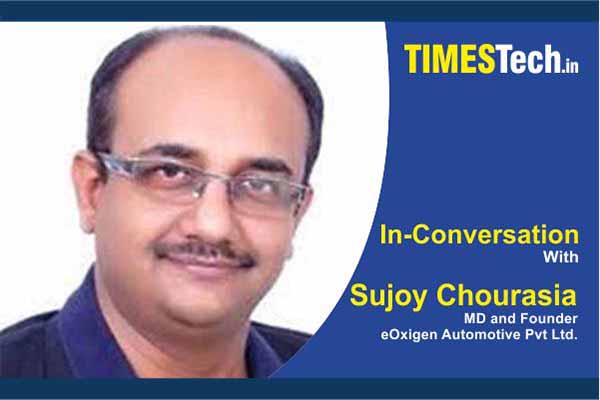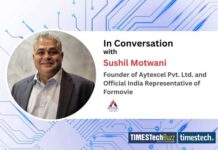Electric Vehicles (EVs) are gaining popularity in India. International auto-makers like Morris Garage (MG), Tata, Mercedes, Hyundai, etc. are selling their EVs in India but their sale is limited in number. Indians have their apprehension when it comes to the service-related aspect of EVs. Services are available only with the car manufacturers for now. If a buyer of an EV is not satisfied with the company’s service centre, he is left with no option. Indians are largely dependent on skilled road-side mechanics for their Internal Combustion Engine (ICE) based vehicles that EVs lack.
New startups are cropping up to fill the gaps in charging and service infrastructure for EVs. eOxigen Automotive Pvt. Ltd. is one such startup that provides last-mile electrical vehicle service repair and maintenance. It also helps Manufacturers of electrical vehicles organize their Indian Made OEM parts, and engages as one of the manufacturing and aggregating supplier.
TimesTech Buzz interacted with Sujoy Chourasia, MD and Founder of eOxigen Automotive Pvt Ltd, to know how servicing EVs is different from IC vehicles, what are the challenges in the EV industry and what his company offers. Edited Excerpts Below.
TimesTech: Existing EV manufacturers are big players in the car and 2-wheeler market. How your services are different from the ones provided by the manufacturers of the EVs?
Sujoy: We are a Brand agonistic (brand-neutral) Electrical Vehicle Service and Maintenance provider, with a micro franchisee offering (minimal investment, Shop in Shop Concept, called Zip Service centre, requiring 80 to 150 square feet of workshop) and can be started in less than 1.7 lakhs of Investment. This platform gives Indian Customers last-mile Servicing, and the Customer does not remain dependent on OEM showrooms for his/her EV servicing need. It’s also a great Service, whereby a new company can simply engage and start giving a PAN India servicing network with us.
TimesTech: What is included in the last mile servicing of EVs and how it is different from servicing normal vehicles like petrol and diesel cars that have a filter, and engine oil that is needed to change at a certain interval?
Sujoy: Electrical Vehicles have a distinct and different requirement vis-a-vis regular ICE Vehicles, an EV is relatively not so demanding on Servicing and repair in its initial 12 to 14 months, but still being an Electro-Mechanical device, it is prone to wear and tear.
The core repair/ maintenance points are as follows:
- Motor requires regular maintenance, which isn’t provided as a service by any OEM in India, it needs cleaning, balancing, and change of some components like hall sensors in case of water or dust seepage inside.
- Wiring needs a regular checkup, as this is the nervous backbone of the electrical vehicle, any short circuit, or loose connection can render the vehicle useless.
- Mechanical faults like dysfunctional motor adjustment, Electrical accelerator not working, display meter malfunctioning, other components like lights horns indicators need repairs, apart from stuff like puncture, etc. We have seen due to Hub motor deployment; many puncture repair workshops deny repairing because they fear the motor may be damaged whilst making the puncture. This requires massive training to showcase how to repair a Hub motor puncture.
- Battery has come up as a critical factor in Electrical Vehicles, (though we haven’t yet rolled out) the last-mile mechanic can be enabled to showcase the quality of the battery, and due to the nature of Lithium batteries, it requires Balancing at regular intervals after 14 months of Servicing to ensure optimum usage, None of the OEM’s has any clue or is making any effort in this direction, it will be a huge requirement for both battery swapping as well as lithium Battery manufacturing OEM’s, with Whom eOxigen Automotive would be ready to share this network with them.
TimesTech: What difficulty your company is facing currently in terms of parts and instrument delivery considering the chip shortage around the world?
Sujoy: Component supply has been critically erratic and pricing has been extremely volatile, in the past 1 year, still we try and ensure that we can stock well in advance and provide a smooth experience of supply available to our consumers as well as our network., With a significant number of Indian companies coming in the manufacturing side (eOxigen Automotive) is also engaging in this manufacturing field with the intent of providing support to the industry. We see this year it will start smoothening out.
TimesTech: Are there any Indian companies that provide compatible parts for EVs like the one that exists for ICE vehicles?
Sujoy: Yes, a huge number of companies have started coming and producing Indian parts and components, like chassis, Plastic covers, meters, IoT devices, battery BMS, Controllers Motors, etc. Many of these companies are in the start-up phase and some are established companies, eOxigen Automotive helps provide access to the market for such companies and also helps in scaling their demand in B2B OEM markets with Manufacturers.
TimesTech: What are your views on Battery swapping infrastructure and what an ideal policy on battery swapping should be?
Sujoy: It’s a very positive action by both the government as well as the industry, as battery plus charging is given in a BAAS Model (Or Battery as a Service Model of engagement), it helps in reduction of an EV price by as much as 45% (i.e. the upfront cost of the battery to be paid if one buys the EV with battery), an advantage to the customer is that he/she need not worry on the servicing of battery which is taken care by the Service provider, including all warranty and guarantees, the service is offered on milage given by the battery, it’s a nascent system and will take time to settle down. Also, it’s a system that does not gel well with the FAME 2 Policy of the government, which requires a manufacturer to declare the battery capacity as a Subsidy on EV linked to the battery. It may not be technically possible to do the same on a swappable battery.
TimesTech: What do you currently find missing in India’s EV ecosystem in terms of EV manufacturing?
Sujoy:
- Core Manufacturing of IC and electronic Chips: Despite such a huge consumption, India still does not have fabricators of Chips and ICs used extensively in Electrical Vehicles and we are dependent on Geography, which isn’t very positively inclined towards the Indian Economy.
- Cell Manufacturing: India is way behind in Cell manufacturing which is the core component in battery assembling and manufacturing.
- Extremely anti-Manufacturing GST structure: India has an Inverted GST structure, i.e. Most manufacturers procure the material at 28% GST, and sell the end product at 5% GST, which leaves a huge claim from the government which takes a significantly long time to be refunded, the average delay is 3 months, and in case of certain mistakes, it takes more than 6 months too. This is squeezing the Working capital for MSMEs (a critical section of the industry needs a smooth cash flow, as most are small industries), even China succeeded by supporting this segment to make it a manufacturing powerhouse. This thought process is critically missing in Indian Policy Making, whilst we have tones of supporting policies, the Operational Implementation on the field is sorely missing. There is a huge gap in comprehending these policies at the implementation level by both private as well as governmental agencies.
- Lack of easy financing options and a differential consumer financing policy are also hurting the EV industry. ICE vehicle is funded with a Rate of interest of only 8.5 to 9% with a longer duration of payback periods, whereas the average EV is financed at a minimum of 14% with shorter payback periods.
















